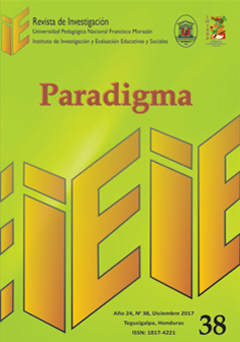The Educational Policies of Equity in Honduras: an analysis from a gender perspective with a look at girls and adolescents present situation
DOI:
https://doi.org/10.5377/paradigma.v24i38.6777Keywords:
equity, gender equity, educational policies, exclusion, cycle of policy analysis, contextsAbstract
The following essay presents and analysis of the equity policies in education from a gender perspective. This analysis is based on a bibliographical review of studies related to the topic, among them the Honduran legal instruments: The National Policy of women, the Fundamental Law of Education and the National Curriculum of Education. The approach is based on the policy cycle of Stephen Ball as to compare the context of influence, the context of policy text production and the context of practice. There is evidence which indicates that gender equity stated in the Honduran legal documents is not applied in the classroom where sexism, discrimination, and exclusion prevail.
As a result, we should not be limited to the inclusion of guidelines, demands based on treaties, participation in conferences and international agreements so that equity policies in education can become a reality but, reflect on the present situation and have a critical perspective on the inequalities between the sexes in the educational scenarios where students and teachers meet.
To conclude, it can be said that 19% of Honduran population is illiterate and is also the dropout rate among school children, being girls, women and ethnic minorities that most affected. Honduras also has the second place in Latin America with the largest adolescent fertility rate reflecting the lack of sexual education in the educational system.
Downloads
1205
Downloads
Published
How to Cite
Issue
Section
License
Transfer of Copyright
- The author, when sending the work, states that it is his will to give the Universidad Pedagógica Nacional Francisco Morazán the patrimonial rights that correspond to him as the author of his work.
- The rights here assigned include all economic rights (Reproduction, transformation, public communication and distribution) and are given without limitation in terms of territory; This Assignment is given for the entire duration term established in the current legislation in Honduras.
- The cession of the aforementioned rights does not imply the cession of moral rights over it, because in accordance with the provisions of the Copyright and Related Rights Law, Chapter II, of the Moral Rights, Article 34, Article 25 , these rights are inalienable, imprescriptible, indefeasible and inalienable.
- The research work or document must be original and have been done without violating or usurping rights of third parties, therefore, the work is exclusively authored and owns the same.
- In the case of any claim or action by a third party, as to copyright on the work in question, the author must assume full responsibility for the rights assigned.
- Upon completion of the Rights Assignment Form, the author states that the work has not been published in another way, that the rights on the work have not been assigned and that no encumbrance or limitation on their use or use is imposed on them.





